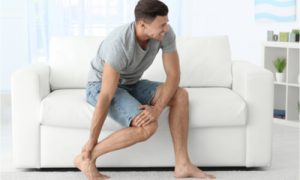Leg cramps happen when an involuntary contraction happens in the leg muscles. Most of the time, muscle cramps in the leg take place in the calf area, sometimes, in the feet and thighs as well. The pain typically lasts for a few seconds and up to 10 minutes if the contraction is severe. Fortunately, there are plenty of home remedies for leg cramps that you can try. Cramps that take place in the thigh often last longer than in other parts. However, you can prevent thigh muscle cramps with proper exercise.
Causes Of Leg Cramps
Before we discuss the effective home remedies for leg cramps, let us first understand it as a whole and determine the common causes of the pain.
 Generally, a muscle cramp is a result of overusing the muscles, dehydration, strained muscles, or staying in a certain position for a long period of time. In most cases, the cause of leg cramps is unidentifiable.
Generally, a muscle cramp is a result of overusing the muscles, dehydration, strained muscles, or staying in a certain position for a long period of time. In most cases, the cause of leg cramps is unidentifiable.
While the majority of leg cramps are safe and harmless, you may need to consider certain health conditions if it occurs frequently.
Some of the medical conditions that are commonly linked with leg cramps are:
- Narrowed arteries. When the arteries that deliver blood to your system start to narrow down, your leg might feel pain as a result. This could happen while you are doing physical activities and usually stops after you rest.
- Compressed nerves. The nerves in the spine tend to get compressed sometimes. If this happens, leg cramps and muscle pain could possibly follow as well. Oftentimes, the pain lingers and stays longer if you walk for a long time.
- Lack of minerals. Not having enough potassium, calcium, and magnesium in your body can result in frequent leg cramps. To prevent this, make sure to add these minerals to your diet.
Other Factors
Certain conditions could also elevate your risk of getting leg cramps. Listed below are some of the risk factors that add up to causes of muscle cramp:
- Age. The older we get, the more our muscle mass depletes. This causes the remaining muscles to get too stressed causing frequent contractions.
- Dehydration. Not having enough water in the body leads to dehydration. When this occurs, the person gets easily fatigued which results in muscle cramps.
- Pregnancy. Pregnant women experience muscle cramps all the time, specifically in the lower leg area.
- Underlying medical conditions. You may not be aware but your underlying medical condition is also one of the reasons why you experience muscle cramps. People with diabetes, liver, and thyroid disorders usually get leg cramps as well.
Home Remedies For Leg Cramps
There are many ways to manage leg cramps. Most of the time, you don’t really need to go to the doctor to fix it. The next time your muscles contract again, consider the listed home remedies below:
- Stretching. If you notice, when an athlete gets muscle cramps, stretching their leg is the initial remedy that’s done to them. Stretching immediately relieves your leg from muscle pain despite the discomfort that it brings. Remember to stretch your leg before and after your physical activities to prevent muscle cramps.
- Massaging the affected area while stretching also helps to keep you relaxed. After the cramps have subsided, find someone to thoroughly massage the contracted muscles in your leg to fully relieve yourself of the pain. This loosens up the muscles and prevents further cramps.
- Heat application. After the massage, consider a warm shower or a few hours in the tub with warm water. Heat soothes the pain that spasms caused plus it relaxes your other muscles at the same time.
- Cold application. You may also opt to throw an ice pack to the area of spasms to relieve pain. This home remedy only requires a bag filled with ice. Simply put it in the area where the muscle cramps occur and leave it there for a few minutes. You can also massage it with the ice pack.
- If the cramps occur in body parts that can be elevated, raise it up. Leg cramps will easily go away if you keep them in a higher position. For example, lie on the bed and place 2 to 3 pillows underneath your leg. Keep it lifted until you feel better.
- Hydrate! One best way to prevent muscle cramps is by keeping yourself hydrated. Water plays a very important role in keeping our health in great shape. Be sure to drink at least 8 glasses of water every day, if possible make it 10 to 12 for better hydration.
- Painkillers. If the mentioned home remedies did not work, opt for an over-the-counter painkiller.
Prevention
The most effective way to combat muscle spasms is by preventing them from happening. Here are the preventative techniques that you can do to keep leg cramps at bay:
- Regularly stretch your legs. Frequently stretching your legs will reduce the risk of spasms and the severity of its pain.
- Drink plenty of water. Water enables the muscles in our body to function properly, making them an essential tool in preventing cramps.
- Do leg exercises. Biking and running are some of the many exercises that strengthen leg muscles. Do at least 1 leg exercise per week to avoid cramps.
- Consider changing your footwear. Sometimes, cramps are caused by poor-quality footwear. Try new footwear that provides optimal support and see the difference for yourself.
- Sleep properly. Sleeping with your feet pointing downward increases the risk of leg cramps. Make sure that your legs are supported flatly by the mattress as well.

